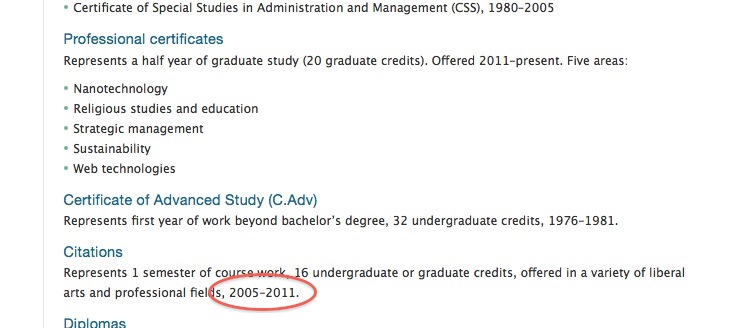Spotted recently on the Harvard Extension School website: Evidence that the Harvard Extension School citation program has been killed off:
The Harvard Extension School citation program was good while it lasted. It let people who wanted to concentrate in a specialized field show their accomplishments and differentiate their degree — a significant issue for people in the Liberal Arts ALM, who don’t receive diplomas that reflect their course of study.
But the rules were terribly frustrating, in terms of what counted and the relatively short window for completing it. I sent this email to the school in 2008 asking about the possibility of getting a citation, based on my coursework and research:
I am a soon-to-be ALM graduate (History), and I have a question about citations. I see from the Extension School website that the window of opportunity for a citation in East Asian Studies lasts three years, and I would like to know if the following four courses — which were all taken and completed within a three-year period, starting in the summer of 2004 — would count. They are:
- ANTH S-171 – Archaeology of the Silk Road
- HIST E-1834 – Chinese Emigration in Modern Times
- History S-1855 – Film and History in Postwar Japan and Post-Mao China
- HIST E-499 – ALM Thesis (Title: Making a Case for Quantitative Research in the Study of Modern Chinese History: The New China News Agency and Chinese Policy Views of Vietnam, 1977-1993.)
You may recall that I asked about this a few years back, but that was before I completed my thesis, under the direction of Alastair Iain Johnston, the Governor James Albert Noe and Linda Noe Laine Professor of China in World Affairs. Getting such a citation would accurately reflect my overall studies at the Extension School, considering much of my coursework and all of my thesis research at the Extension School has been on East Asian history — especially China.
The answer: No, because the thesis didn’t count. This was despite the fact that the thesis was directly related to modern Chinese history, was directed by a tenured faculty member and expert in the field, and took 10 times as much effort than any single class at the Extension School.
In addition, I had taken another eligible class in early 2003 (History E-1830: The Emergence of Modern China). But again it couldn’t count toward a citation, as it was outside of the three-year window for a citation — hardy a rare occurrence, considering most students don’t have the luxury of being able to take classes so rapidly and certain courses aren’t offered every semester.
Harvard Extension School citation vs. Harvard Extension School certificate
Back to the retirement of the Harvard Extension School citation program. According to two curt emails sent to me by the Harvard Extension School staff member in charge, the school discontinued the citations in favor of Harvard Extension School certificates.
This doesn’t make sense. Certificates have nothing to do with most liberal arts master’s degrees offered by the Extension School, which was the focus of the citations. Rather, certificates are a profitable, short-term continuing education scheme for people in various industries, although the program page notes you can apply the course credit in four out of the five programs to professional ALM degrees. Several of the certificates, such as Web technologies, are entirely online — no face-to-face contact with fellow students or instructors required!
If you are earning a liberal arts ALM, and wanted to get additional recognition for your work in a certain field, you are out of luck. But that’s no surprise. The liberal arts character of the Extension School, not to mention the in-person classroom experience taught by Harvard professors that defined the Extension School experience beginning 100 years ago, has lately been given short shrift, in favor of scalable, impersonal online coursework that limits contact with actual Harvard professors and is oriented toward profitable professional education. I won’t get into that here, but you can read more about my thoughts on these and other Harvard Extension issues.



